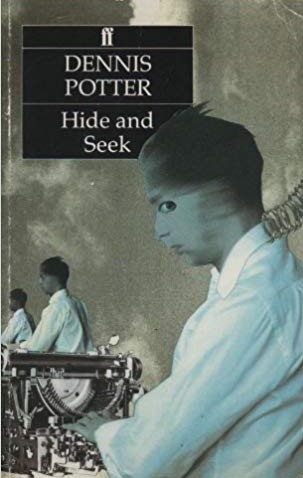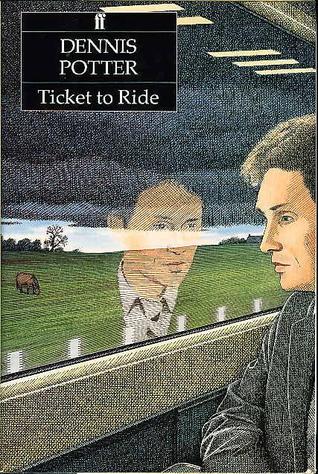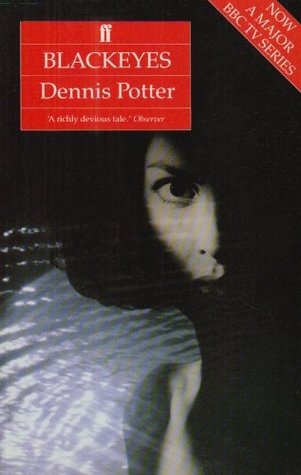When it comes to Britain’s late, great Dennis Potter, a few core obsessions tend to predominate: madness, perversity and, most importantly, the slippery nature of reality. Potter’s television epics—including THE SINGING DETECTIVE, PENNIES FROM HEAVEN, COLD LAZARUS and dozens more—are rightly considered classics, and remain among the most innovative programs ever created for that medium. Potter also authored screenplays for films as diverse as BRIMSTONE AND TREACLE, TRACK 29 and the feature versions of PENNIES FROM HEAVEN and THE SINGING DETECTIVE. But equally important to Potter’s oeuvre are the three novels he published prior to his death in 1994: HIDE AND SEEK, TICKET TO RIDE and BLACKEYES.
Potter’s TV dramas and movie scripts are certainly deserving of careful study, and have for the most part received it. Far less attention has been granted his novels, possibly because the latter two were adapted for the screen (one as a feature film and the other a BBC miniseries) and subsequently overshadowed by the results. There’s also the fact that Potter simply never attained the same brilliance as a novelist that he did writing scripts. However, Potter’s books stand head and shoulders above most modern fiction, “experimental” or otherwise.
 HIDE AND SEEK (Faber & Faber; 1973) was Potter’s first stab at fiction writing, a striking (if monotonous) post-modern account of Daniel Miller, a man with a unique affliction: he believes himself to be a made-up character in a book. With his deeply irascible personality, Miller seems intended as an autobiographical stand-in, and a none-too-flattering one, for Mr. Dennis Potter (a la THE SINGING DETECTIVE’S Philip Marlowe), whose misanthropic tendencies were legendary. And yet Potter casts doubt on that suspicion with a curious narrative twist: around page 40 the viewpoint changes to that of the author of the book, desperate to convince us he’s different from the person he’s writing about.
HIDE AND SEEK (Faber & Faber; 1973) was Potter’s first stab at fiction writing, a striking (if monotonous) post-modern account of Daniel Miller, a man with a unique affliction: he believes himself to be a made-up character in a book. With his deeply irascible personality, Miller seems intended as an autobiographical stand-in, and a none-too-flattering one, for Mr. Dennis Potter (a la THE SINGING DETECTIVE’S Philip Marlowe), whose misanthropic tendencies were legendary. And yet Potter casts doubt on that suspicion with a curious narrative twist: around page 40 the viewpoint changes to that of the author of the book, desperate to convince us he’s different from the person he’s writing about.
For those clued into Potter’s game—that the author and his fictional creation are one and the same—the book’s third act, wherein the author loses touch with reality and comes to confuse himself with Daniel Miller, is rambling and even unnecessary. For that matter the entire book, in light of the complexity of Potter’s later work, feels rather sophomoric.
HIDE AND SEEK is, in essence, an early summation of Potter’s lifelong obsessions. The grouchy protagonist would prove to be a recurring motif in Potter’s universe, as would the diverging narrative voices, a convention often expressed in Potter’s teleplays by having characters break into archaic song and dance numbers expressing their innermost sentiments. In his fiction Potter utilizes the simpler yet equally radical conceit of switching from the first to third person (and vice-versa).
Potter’s follow-up novel TICKET TO RIDE (Vintage; 1986) appeared thirteen years later. It is in my view  his most potent work of fiction by far, relating the mind-boggling tale of a “tall and sharp-boned” man who as the novel opens finds himself suffering from amnesia aboard a train.
his most potent work of fiction by far, relating the mind-boggling tale of a “tall and sharp-boned” man who as the novel opens finds himself suffering from amnesia aboard a train.
Correction: the amnesia doesn’t occur until page 2. Significantly, the man suffers a sudden reality shift, an occurrence “as swift a disaster as falling into an uncovered well and breaking every bone in his body.” The eight paragraphs preceding the shift, describing the character’s already tenuous mental state as he gazes out the train window, contain pertinent clues to the story’s (possibly unsolvable) solution. Of particular importance is the opening sentence: “A minute away from disaster he was thinking that nothing was the same anymore, and that nothing would ever be the same as it used to be…”
As the man, who christens himself John Buck, struggles with his newfound amnesia, we’re introduced to John and Helen, a severely unstable couple. Helen, we learn, was once a call girl who called herself Penny. John the amnesiac, meanwhile, finds himself drifting into a hallucinatory realm where levitation and sudden disappearances are the norm and a dimly recalled woman named Penny is apparently the key to understanding it all.
Inevitably the two narrative strands converge in various unpredictable ways. It gradually becomes clear that a murder has been committed, or perhaps several murders, carried out by John, Helen/Penny, or both…or possibly neither. Potter offers no concrete answers, providing a schizophrenic account stocked with characters that are ultimately unknowable. Ditto the book’s constantly shifting setting (SECRET FRIENDS, the 1992 film Potter adapted from TICKET TO RIDE, takes place entirely during John’s fateful train ride, although I had a hard time finding any such indication in the text).
It’s up to the individual reader to decide whether Potter is playing fair or merely playing with us in a tale that recalls literary gamesmen like Pirandello and Nabokov at their trickiest, along with L. Ron Hubbard’s “lost hour” pulp classic FEAR (albeit without the tidy wrap-up Hubbard provided). TICKET TO RIDE is in its own way just as playful as HIDE AND SEEK, but its aims are far more mysterious and idiosyncratic.
 The following year brought BLACKEYES (Vintage; 1987), a breezy, even lightweight respite from the previous book’s unrelenting grimness and puzzlement (although Potter’s 1989 BLACKEYES miniseries, loosely adapted from the book, is as dark and obsessive as anything he ever conceived).
The following year brought BLACKEYES (Vintage; 1987), a breezy, even lightweight respite from the previous book’s unrelenting grimness and puzzlement (although Potter’s 1989 BLACKEYES miniseries, loosely adapted from the book, is as dark and obsessive as anything he ever conceived).
It’s the slyly comedic tale of Jessica, a young fashion model whose 77-year-old uncle Maurice James Kingsley has penned a surprise bestseller. Potter announces his intentions straightaway by beginning the book with Jessica reading her uncle’s potboiler, a thinly veiled account of Jessica’s own life and modeling career undergone by an imaginary heroine named Blackeyes. We read what Jessica reads, periodically interrupted by her autobiographical reflections.
But things grow more complicated as Jessica, dissatisfied by her uncle’s ending in which Blackeyes commits suicide, decides to supply her own more optimistic capper. A further narrative strand is added by a supporting character who in the final third intervenes to add his first-person observations on the unfolding drama.
BLACKEYES can be viewed as an amusing and endlessly thought-provoking romp through many of its creator’s favorite themes. If it feels a bit slight overall that’s probably because the book is largely consumed by Kingsley’s trashy and sensationalistic narrative (the fact that its tackiness was intentional doesn’t make it go down any easier). But the novel as a whole could ONLY have emerged from the mind of Dennis Potter.
Sadly, it’s also the last novel Potter would write. Whether he became consumed with television and film assignments or simply grew disenchanted with the format (shortly before his death he claimed that “I think the novel is almost dead”), Potter’s three-time excursion into prose fiction feels incomplete. Had he stuck with it, I’m positive his books would have grown in accomplishment. Indeed, the energy and invention of Dennis Potter’s three novels suggests that, if anything, he was just getting started.
